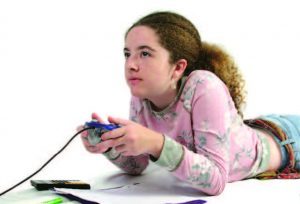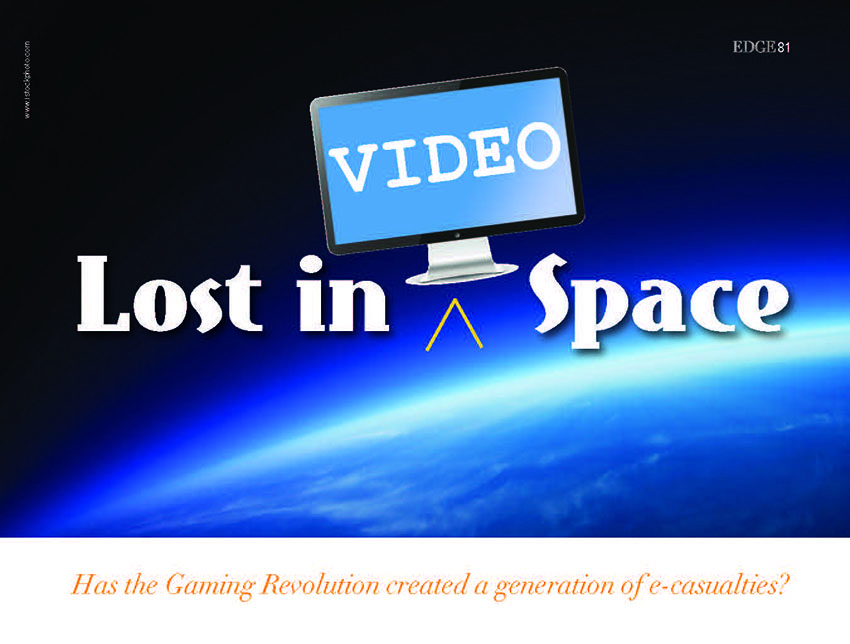Has the Gaming Revolution created a generation of e-casualties?
I’ve been in the city for the day and return to discover my son still home. “Did the SPCA end early?” I ask. He gives me a dazed look. “I’m leaving now.” It’s 4:30 in the afternoon and he’s been so absorbed in his video game that he lost track of time and reality. His volunteer job is nearly over for the day.
I am the mother of an electronic addict. By electronic, I don’t just mean compulsive video gaming, which is much like gambling addiction. I mean our son is addicted to the whole electronic shebang: TV, his computer, iTouch, iPhone, anyone else’s Xbox or Wii. He can play video games, Skype with fellow gamers, watch YouTube, Dr. Who and NCIS, simultaneously and ad infinitum. Electronics—like the Zombie movies he’s captivated by—suck in his brain, consuming his concentration at the expense of schoolwork and relationships. Neuroscientists have noticed the changes in electronic-obsessed brains that mimic those of an addict. And electronics for my son are like the junk food of his life.

www.istockphoto.com
If he could regulate his appetite and intake of electronics and limit his usage, I’d have no problem. But once he sinks into the family room sofa, he becomes an electronic couch potato. I know these are strong words from a parent, and maybe it seems that I’m throwing our son under the bus.
However, he is cognizant of the issue and actually helped me research this story. We’ve been talking about his electronic addiction for several years and at college he has a “coach” with whom he can discuss his obsession with gaming.
“Vidiot” perhaps is too harsh a moniker for my son, as he eloquently discusses the finer points of a particular game’s digital animation and interaction. Gamers see video games as a cross between a science and an art. This is nothing new. We can trace these gamers back historically to arcade game aficionados of 30 and 40 years ago. It’s become so imbedded in our culture that various science museums have mounted interactive gaming retrospectives, beginning with Pong and Space Invaders. There is, in fact, an appreciation among video gamers that borders on connoisseurship (in the way a wine expert might also be a drunkard). Our son’s good friend, who plays in video game tournaments for minor profit, suggested I try a certain game and see how fast I got hooked. Interesting idea, but it holds no appeal to me.
To be sure, electronics has influenced our culture in positive ways. Both the art of Japanese anime and video graphics has fostered and influenced a whole new dimension and medium of art. Over 30 years ago, Nam June Paik fused video with music and performance art at his 1982 Whitney Museum retrospective. Digital art has flourished ever since. The audience created by global web use also has inspired some artists to create installations reflecting our obsessive usage. Artist Rachel Lee Hovnanian uses iPads as substitutes for husband and wife at the dinner table, bride and groom at their wedding feast and even her depiction of multi-generations of a Chinese family—all of whom are engrossed with their iPhones and ignoring each other—at a lunar New Year’s feast. Each installation depicts the haunting message of our daily struggle and infatuation with the cold allure of electronics and our subsequent loss of human interaction and warmth. And electronic addiction has become a hot topic in the press, with Jane Brody writing a two-part piece in the Science section of the New York Times and PBS recently airing a program devoted to Web Junkies.
Some colleges are viewing high-achieving gamers with good GPAs as possible recruits for campus e-sports. At Robert Morris University in Chicago, being a web jockey can translate into a full-ride scholarship. This fall, the University of Pikeville, a liberal arts college in Kentucky, has devoted 20 scholarships to League of Legends video gamers. League of Legends is a multiplayer battle game played online. Full Sail University in Winter Park, Florida, has offered BAs and MAs in game design and development for years. In addition, opportunities for gamers who can program abound in tech and entertainment companies. But that requires being entrepreneurial, ready to tackle Java and C++—and a willing ability to apply for a job.
E-Tox Detox
So electronics can be the user’s best friend or worst enemy. How did our son get hooked? We made every effort to discourage him. During the week, we’d snap the breaker that powered the TV to the Off position. We never owned an Xbox or PlayStation. Yet our son would ferret out video games online—passwords were minor hurdles—or play at friends’ houses. I can’t say it started with the Game Boy Color his grandmother gave him for Christmas, or the robotics team he joined in middle school. Probably part of the appeal of electronics is that it’s the playmate that’s always ready to play. Also, kids who have trouble focusing in school hyper-focus on gaming, and any anxiety in school will fuel the need to take solace in the alternate reality of video games. As our son matures, he is slowly grasping the benefits of focusing on his college courses and the rewards of working hard at his summer job.
Electronic addiction, it turns out, is not uniquely American. It is a global problem. India and Singapore actually have the highest incidence of Internet Addiction Disorder (IAD).
 SETTING LIMITS
SETTING LIMITS
According to Dr. Rodger Goddard, Chief Psychologist at Trinitas, Internet use, social media, video gaming and being hooked on technology is a very intense problem for our children (and many adults) today.

Rodger Goddard, PhD Chief Psychologist,
Trinitas Regional Medical Center 908.994.7334
“I believe that we are undergoing an experiment in child-rearing. Never before in history have children been brought up with such intense exposure to technology. We do not yet know the results of this experiment. Research is showing that it may be having a very negative impact on our children’s learning skills and potential for success. The best advice for parents is to limit the time their child spends online and screening. Taking away electronics as a punishment can sometimes make using it even more attractive and exciting. Limiting its use gets a child more accustomed to being without continual technological exposure. Some parents have found that no screening outside of school work during the week and just a few hours on the weekend is just the right amount.”
According to a story in The Telegraph, a British newspaper, it’s epidemic in China, too: over 24 million suffer from some form of internet addiction. As a result, internet “boot camps” have been set up across China to take addicted kids—estimated at 14% of all youth—off the grid. In Japan, “internet fasting” has been set up to help create electronic “detox.”
Our own “detox” program has been to send our son on programs in the Pacific Northwest and Alaska, where he is completely off-the-grid for weeks and able to experience nature’s beauty while ice-climbing, sea kayaking and scaling a rugged mountain at midnight to watch a meteor shower. As a college student, he has also trekked in faraway lands in the Himalayan foothills and in rural Central America. His most recent trip lasted a semester. While he has risen to the occasion, learned about Tibetan refugees and Buddhist monks and considered social justice issues of Guatemala, Nicaragua and El Salvador, the challenge is still there. He returns to electronics the moment he gets home. And, needless to say, our version of detox has come with a hefty price tag.
Which is not to say that breaking video game addiction is ever cheap. Or easy. Although it is strikingly similar to more familiar addictions, such as alcohol, food and drugs, it is unlike them in that gaming can occupy every waking hour and involve everyone in an addict’s social network. Another problematic aspect of video game addiction is that gamers are separated from others by thousands of miles, and also by the ability to edit their words before hitting the return button. As a result, they can be uncomfortable dealing with others face-to-face and unedited, which makes traditional therapy a particular challenge.
The consensus among therapists is that families need to unplug their addicted gamers and, ideally, put them in situations where they are stimulated by non-electronic activities and develop off-line social skills. Options range from the aforementioned boot camps and fasting programs to wilderness camps and boarding schools, all of which are geared toward breaking the addiction. The challenge for parents is to pick an option that suits their child’s personality and demeanor.

www.istockphoto.com
Perhaps the most striking development in this area is that health insurance companies are starting to address video game addiction, if not specifically then under “compulsive disorders” or “depression.” Which means we may soon see an entire industry created around breaking this addiction.
MIT engineers recently developed a keyboard that delivers an electric jolt to over-users. I’m not sure our family will be an early adopter of this device, but I have to admit that it did cross my mind. EDGE
Editor’s Note: Is your child hooked on electronics? The web site netaddiction.com offers an internet addiction test that may be an eye-opener. Special thanks to Ben Fleming for his work on this story.





